Highway of Navarra. Ecology has a lot to say
Since then it has been a lot of years and as is evident the economic situation, the number of inhabitants and with it traffic and communication needs have changed radically. On the other hand, our administrations have carried out works and improvements in this road, extensions, new pavements, signs, timely repair of some curves, etc. have been limited to the realization of the same, but little has been done to the tracing and hence the lamentable current state of the road, unable to keep the traffic flowing and safe.
We do it, and we are the first to proclaim that San Sebastián and Pamplona, Gipuzkoa and Navarra must be well united by a safe road. But with this we don't want to give a white card to do that task anyway.
Details of today's project. A little history
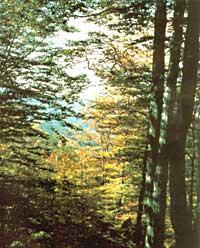
Five years ago we wanted to carry out the project of motorway connection with the Tolosa highway to give continuity to the highway that closes to Irurtzun and, above all, achieve its economic viability. Great opposition was created and they had to abandon the project.
In mid-spring last year rumors were resumed to our peoples, although some mayors (such as Lekunberri and Gorritikoak) moved to the Government of Navarra, asked for clarifications and had to return empty to their villages.
At the end of May, the Parliament of Navarra jointly approved the draft motorway and established a period of one month to submit claims. All parliamentary groups were favorable, although the information to make the decision was scarce and despicable.
In summer the Gipuzkoa Boards took advantage of the controversial Special Plan they want to carry out to legally channel the motorway. Euskadiko Ezkerra refused.
Obviously, the time when the Administration has opted for public information, appropriation of the project, attention to the public and satisfaction of the allegations has not been the most appropriate and that decision has not been the result of chance.
Subsequently, the Government of Navarra and the Diputación de Gipuzkoa met on the sale of Mugiro and both entities have signed an Agreement to define how participation in the project should be and prepare the coordination elements.
Since the preliminary draft was within the public information period, the signing of this agreement represents a great contempt for the peoples and those affected and clearly demonstrates the arrogance and pride of the Administration. Because they want to present things made, without remedy, as if they were irreversible.
Project
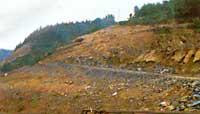
It has been decided in advance the connection between Pamplona and San Sebastián by motorway, and in addition to all the conditions that suppose to be motorway: have four lanes, a maximum slope of 6%, do not make curves with radios less than 250 meters…
All this from an immovable point of view, through computers the designs of four possible plots have been made and studies of their impact or impact have been commissioned to know the social, ecological, economic implications, etc. of each layout.
The impact study showed that the most sustainable was that of Huitza. However, they chose another one without explaining the reasons, perhaps because they had already decided in advance, or because they had to build a tunnel in the Huitzi alternative and because the tunnels are black ghosts of our engineers today, or perhaps because the dynamic people of Leitza are too close.
However, the project is as follows: From Irurtzun to the sale of Mugiro will be left for a next phase. Now leaving Lekunberri to the left, starting from the sale of Mugiro, they want to cross Gorriti and Areso over the village of Azpirotz. From there, they go towards the Urto de Berastegi and from Urto-Urt you access the valley of Leizaran from the hill of Gorozmendi, located between the mountains San Lorenzo and Ceboliño de Larrea. From there they would finally close to Villabona and Andoain.
Impact Study
We can say rare things about this research. The first on its objective, since no study has been commissioned on the most appropriate form from the point of view of the socio-economic, cultural and ecological consequences to unite Pamplona and San Sebastián. As already indicated, it has been analyzed which of the possible plots previously resolved is the least affected. Only this problem subtracts all the value to the result of the investigation, even more so if we take into account that they have not yet paid attention when selecting it.
Throughout the research, possible conditions are assessed on four levels: compatible, moderate, severe and critical in Castilian words. When defining the critical level of research itself, he says: "the critic, on the other hand, can be accepted, and although it is not reparable or integrable with the adoption of remedial measures, there can be in the long term a profound alteration of the quality of the environment that, adapting to the new situation, will allow to obtain the space integrated with certain harmonies".
This assessment is terrifying, because thanks to it the worst project, which generates greater impacts and damages, is justified. In our case, this opinion would lead us to the approval of a consistent modification of the quality of the Leizaran valley that required a natural reserve, in exchange for a new space that could be a hypothetical "integrated space" in the long term.
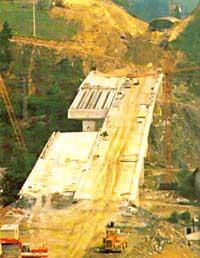
On the other hand, no specific criteria are used when assessing the impacts: the chronic contamination of surface waters (occurring in kilometers 11.6 and 15.9) is moderate, the disappearance of streams, the destruction of the margins of streams in six points, the viaducts and the modification of the routes of the palomeros groups. Groundwater pollution (which will then be used in Elduain and Tolosa) is moderate. Destruction of bushes and meadows during 14 kilometers of Gipuzkoa is considered harsh.
This means the destruction of 21,86 Ha. of native forest, 52,97 Ha. of pine trees and the like, 17,11 Ha. of grass, 12,39 Ha. without taking into account the impact that the execution of the works will cause in the environment. Landscape alteration and renewal of sensory factors are also difficult. The other impacts are considered invaluable, but in any case they are gravel, such as the surplus that will occur at the start of land (2,000 million m3 of land that they do not know how to introduce).
In general, and without forgetting the subjectivity of gradation, the authors of the “Impact Study” consider that the chosen alternative is of great impact. Nothing makes us think that it has been done seriously when analyzing the socio-economic impact. However, it seems that the issue has been made without deepening and with much frivolity.
Criticism of the project
In view of the history and surroundings of the project, the conditions and the "Impact Study" that has been carried out, we will now see the criticisms we make to the project:
- In addition to these problems, we criticize the behavior of the Administration. In fact, they have used little information and manipulated, they have not taken into account the interested parties or those affected, and they try to create in the population the psychological impression that there is no viable opposition.
- The evolution of traffic between Pamplona and San Sebastián does not justify the construction of a new motorway.
The documentation provided for public information in Navarre includes a research paper that studies the analysis of road traffic and its service capacity. It indicates that in the sections where there are normally two lanes and a slope exceeding 4%, the maximum admissible traffic of the road with third lane is 17,153 cars/day.
"With an estimated traffic intensity of 5,000 cars/day by the time of the road premiere, traffic should be increased 3.4 times for road overflow. Currently the traffic is very consolidated, so we can expect growth rates between 0% and 2% for the coming years. (Forecasts of the General Road Plan of PGOU 1.985). Therefore, with a growth of 2% annually the road would take 62 years to reach the level of saturation". Above these figures referred to in the draft document, it would be necessary to build a motorway.
For its part, the MOPU considers that more than 10,000 cars/day can start thinking about the highway. Keep in mind that you use the verb "hasi".
Therefore, as the official documentation itself recognizes, one can begin to consider the construction of a highway above 10,000 cars/day, being necessary more than 17,153 cars/day.
Let us now look at the official traffic statistics.
Let us now take the evolution of the traffic that show the different options that can be made to go from Pamplona to San Sebastián:
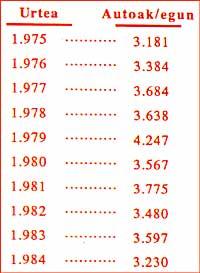
Let us also analyze the data of other roads that may be involved:

From these numbers we can draw two important conclusions:

- That traffic rates are fixed in recent years or go hand in hand.
- Although we link the traffic of the different roads that can be chosen between Pamplona and San Sebastián, to consider the construction of the motorway does not reach the amount mentioned above. If we eliminate the local traffic on these roads, which can reach 50%, the numbers remain smaller.
All this with respect to existing traffic. But what can happen to traffic in the coming years? In Gipuzkoa and Navarra, and also in Aragon, population growth is close to 0% or below 0.
The same can be said of industrial production. The future industrial model will not generate an increase in road transport. The industry will take other ways: information transport, computing, telematics, etc. Therefore, if there is not a rare population growth, traffic in the coming years will remain practically at rates similar to the current ones. Therefore, the current traffic and what is expected in the coming years do not justify the construction of the new highway.
Abrupt design of the new motorway
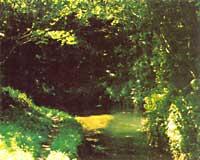
The cancelled project of the highway was ahead of the highway, it touched by the funds of the valleys, touching the private property... and therefore a great opposition was created. The designers of the highway, on this occasion, present to us the highway that runs through the summits of the mountain to overcome the opposition of this private property: far from the backgrounds of the valleys, touching the communal ones of his property,
They have reduced opposition, but have been pushed into an arduous design. In this way, the route of the motorway will run largely between 600 and 700 meters high, facing north. The experience of all shows us that the port of Azpirotz (605 m) marks a special level: snow and wall. And even worse: its inhabitants (shepherds, farmers) assure that in the six months of the year there are large clouds at that height; for a month the snow and throughout the winter the food and the walls.
The motorway designers have not taken this into account, much less. This necessarily eliminates the highway project. What light and safe road do you want to do with this type of weather?
Azpirotz, Gorriti, destroys Areso
The resources these three peoples use for life are seriously damaged; irreparable. The land would disappear, the firewalls would also be left in the villages and large land transports would be carried out over Azpirotz. The drivers of the highway are forced to carry out great works in the area of Gorriti and in the center of Areso, eliminating the fields of cultivation, minimizing the corralizas for the cattle and provoking an ancestral harmonious life. Nature would break the ecological balance they have maintained for a long time.
Leizaran Valley
The lung of Gipuzkoa, the nature reserve and the valley of Leizaran, which should be a place for conservation and conservation, deteriorates from top to bottom. The natural power that houses the valley will be made available and service of the highway. The wealth of livestock, fauna, clean water, flora, tree and its own ecosystem will not be cared for or enhanced.
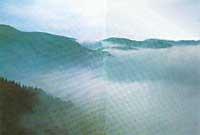
It will happen backwards; they will find themselves in the impossibility of surviving and resurrecting. The ecological anti-highway argument makes all its sense in Leizarán. Only savage civilization (one that respects neither the environment nor natural wealth) could do this barbarity.
There is no legal basis for the construction of the motorway
The construction project of this highway has no legal basis either in the "National Road Plan", or in the "National Highway Plan", or in the MOPU Plans, or in the General Urban Planning Plans. Even more: It can also be unconstitutional, since the work corresponding to the two autonomous communities can only be assumed by the State.
To overcome the lack of legal basis, they have opted for a rough way: Through a "Special Plan". This is a "Special Plan" because it is only about the development of a more general Urban Plan that does not exist in this case. In this area it has been precisely the allegations and remedies presented by the coordinator from the point of view of legal formalism.
Waste and ruin
The project includes an expenditure of 22,000 million. Every kilometer of the motorway that is currently headed from Tolosa-Beasain, and which is easier to travel, has a cost of more than 1,000 million per kilometer.
This work, much more complicated to perform, will have at least that cost per kilometer. Therefore, real economic spending at best will be double what they say.
In Navarre and Gipuzkoa, and in a society immersed in extreme crisis, rather than in this work that is not justified, we can allocate that amount to another thousand more necessary projects.
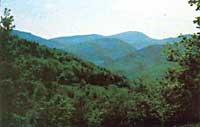
Those funds that want to get into the bag of the motorway, we could also use them in the field of public works with a more clear and direct objective: to solve the problems of variants in many villages: (Tafalla, Noáin, Irurtzun, Lekunberri, …), to further resolve the Navarra-Gipuzkoa communications network: (for example, the road from Leitza to Tolosa), the installation of comfortable and good public railways and transport, the repair of the same road N-240 Iruña-Donostia. Improve bad communications in Navarre with Iparralde.
Our alternative
It would be totally normal and natural for those who remain in their good sense, or for those who do not have unconfessable objectives or interests, to study how the current road can be improved when looking for solutions to the problem of communications between Pamplona and San Sebastián. Thanks to what the Administration has not done, we have the road in such precarious conditions. The first reasonable step would be to study well how the road can be arranged.
Before the work that so much damage generates begins, before so much money is entered, should the Administration not study all other options?
We believe that yes, and for our part, and with the few technical and economic means we have, we give a more adequate, normal and natural alternative: the improvement of the current road, using part of the money they want to spend on the highway. It is proposed that the port of Azpirotz pass under a tunnel (simultaneously overcoming the attacks of climatology), or that a new design of the port be carried out (construction of third lanes, making variants in the villages to your liking, suppression of curves and use of tunnels).
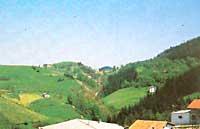
We are sure that this way we would achieve a good, safe and agile means of communication between Pamplona and San Sebastián, without drilling the winds of Irurtzun, leaving in peace Azpirotz, Gorriti, Areso and Leizaran, and offering a great future to the natural passage that goes from Irurtzun to Lekunberri. We believe that the administration should take this alternative into account.
Causes of highway drivers
They give us two reasons:
- That Pamplona and San Sebastián should be better communicated.
- That Navarra is the last option within the European industrial production dynamics and within the European transport network.
As for the first, we fully agree.
While they give us the second reason, Pamplona and Baigorri, Eugi and the road that would unite Urepel are being planted. Would this road not meet Europe? If we improve the current road, wouldn't we achieve the same goal?
We are aware that the realization of this type of works is a great business for those who carry out them, being the case of the highway of Navarra the clearest example of it. That is where we should surely seek true reason. The process of militarization that our society suffers and the fact that it is within NRO can also have to do with this problem.
Background problem
We must use a more complete sense of communication: not just one road. We have to be an open, more complete sense of communication: The roads of Belate, Lizarrusti, Etxegarate and Bera must be well placed, with good and effective means of public transport (rail and bus), with the elimination of toll roads, with variants towards the village…
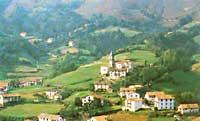
The decision made by our authorities is a decision that falls within the developmental philosophy: without respect for the environment. They give priority to the existence of a motorway and adapt the soil to this great work, with its geographical environment and its natural riches to a background.
The civilized people, for their part, should give priority to the environment and adapt to the terrain. This will be the only form of dignity to enter Europe and the future.





